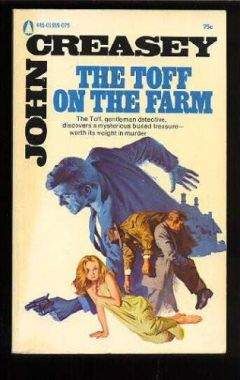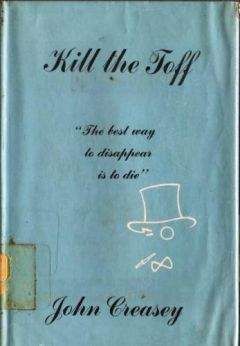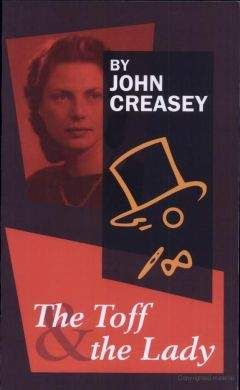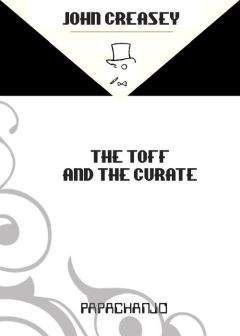John Creasey - The Toff And The Stolen Tresses
He clipped on the knives, put another gun into his pocket, a gas pistol like the one he had first used against Wallis.
He had a queer feeling about Wallis; it was almost as if the man was watching him, although he was in jail, and as though one of the hooligans who would so readily do what he asked was outside.
He waited until there was a knock at the front door, went across, opened the door a fraction, and said:
“Who is it?”
“There’s a packet here from Radio and Recording Supplies, sir.”
“Put it down and leave it, will you?”
“Very good, sir.”
Rollison waited until the man’s footsteps had gone, then opened the door cautiously: Wallis might have powerful friends ready to attack. The landing was empty. The packet, neatly wrapped up in brown paper, looked innocent enough. Rollison took it into the big room, and undid it cautiously. Inside was a small tape recorder, worked from a battery, extremely sensitive and with enough tape to record for nearly an hour.
And it would go into his pocket.
“Thanks, Bill,” said Rollison.
He went out the back way, and was quite sure that no one who saw him knew who he was.
He walked to the nearest Tube station and went to Charing Cross, changed there for the train to Whitechapel. It was a little after eleven o’clock when he arrived, and only a dozen people got off at the station. No one looked at him twice. He walked with a kind of swagger, as if he’d had more than enough to drink and stared down at the ground all the time. Outside, he turned first towards the Blue Dog, passing the gymnasium, where lights were still on.
He headed for Dirk Street and the docks.
No ships were being worked nearby, all the dockside noises came from some distance off; that was a pity. He walked along Dirk Street, and saw lights at several of the houses, including Wallis’s. He went to the back of the house, using a narrow alley, found out which was the rear entrance, and made himself familiar with the little back yard. Then he went back towards the gymnasium, but did not go too close to the lights.
“Want anyfink?” a man asked.
“Ebbutt arahnd?”
“He’s too busy to touch tonight, mate.”
“I got information to sell.”
“Wot abaht?”
“Rollison.”
The name worked like a charm. The man hurried into the gymnasium, and Ebbutt soon came out. He approached Rollison, wheezing in the chilly night air, and as he drew near he flashed a torch into Rollison’s face.
Wot the hell—” he began, and then caught his breath.
“Easy, Bill,” Rollison whispered. “I want a kip for the night, somewhere I can get away from early in the morning. Can I have a camp bed in the gym?”
“It’s all yours, Mr. Ar.”
“Forget the Mr. Ar. Anyone else sleeping there tonight?”
“No.”
“Fine. Any news for me?”
“There are a couple of blokes at Wallis’s place, Wallis ain’t taking no more chances with his wife.”
“We can’t blame him, can we?” Rollison said, and forced a grin, but he did not feel like smiling. “Let me have the gym key, Bill, will you? And any luck with those sparklers?”
“Yeah, to both,” said Ebbutt. “Wouldn’t like to tell me wot you’re up to, would you?”
“No,” Rollison said. He took the key and a small packet which Ebbutt gave him, gripped the huge forearm, said: “Thanks,” and moved off. He reached a telephone kiosk in the Mile End Road, dialled Grice’s home number, and wasn’t surprised to be answered promptly: Grice wasn’t an early-to-bed enthusiast.
“Rollison,” Rollison said.
“Oh, it’s you. Changed your mind?”
“No. Two of Wallis’s friends are on guard at his house tonight. Could you arrange for the Division to send a couple of men to pick them up about four o’clock say?”
Grice hesitated, and then said gruffly: “This is the first time in my life I’ve ever seriously thought of compounding a felony. I’ll try to fix it. But don’t make any mistake, if you get caught, I can’t help you. I’ll say that I know absolutely nothing about it.”
“All you have to do is your duty,” said Rollison solemnly. “Thanks, Bill.”
He went back to the gymnasium, where most of the lights were out, and a camp bed was made up, and a bottle of whisky, soda water, ham sandwiches and some cheese and biscuits were on a table nearby. He ate heartily amid the smell of sawdust and canvas, and then looked at three small diamond rings and two brooches which were in the packet Ebbutt had given him. He put them carefully in his pocket, and at one o’clock, got into bed, taking off his shoes and loosening his choker.
He was asleep within five minutes, and awake at half past three, as if an alarm clock worked inside him.
He went into the chilly morning air, and shivered, but his spirits rose when he saw dark clouds obscuring the stars; the street lighting was very poor. He went a long way round to Dirk Street, and just as the daylight was coming, stepped into the back yard.
A police car approached a few minutes afterwards; and turned into Dirk Street. No one would be surprised and probably a lot of hearts were beating uncomfortably then: but it was not until the stroke of five thirty that Rollison heard a heavy knocking at the front of the house. After a moment, lights went on upstairs; then one went on in the kitchen, where a man had been sitting in an armchair. He saw the man go slowly towards the front of the house, and a moment after through an open doorway, saw another man join him in the narrow passage.
The banging came again, and Rollison fancied that he heard a man calling the formula: “Open in the name of the law.”
Rollison used the key he had taken on his first visit, slipped inside, closed the door and stepped straight to the larder, where Stella Wallis had been imprisoned. He left the door ajar. Men were talking and arguing, Stella’s voice sounded shrill and angry, and then one of the men raised his voice:
“You can’t do this to us, I’ll see my lawyer!”
“You see him at the station,” a policeman said. “Don’t make a fuss. You’re only wanted for questioning.”
Stella said viciously: “One of these days I’ll tell you what I think of you, you slab-faced piece of bacon. There’s nothing in this house that shouldn’t be, and there never has been. My friends are a damn’ sight more honest than any cops.”
“Listen, Stella,” one of Wallis’s men said, “go and ask Ropey to come along. He’ll be okay, and—”
“Oh, it’s not worth worrying about now it’s light,” Stella said, and stifled a yawn. “It’s okay, Tiny won’t blame you because the rozzers picked you up.”
Confused sounds followed, next the slamming of the front door, then the sound of a car engine; and as it hummed, Stella Wallis came walking from the hall. If she came to the kitchen to make tea, she would almost certainly open the larder door.
Rollison waited tensely.
She went upstairs.
* * *
Some minutes afterwards, Rollison went into the living room and sat in an armchair. He did not put on a light but waited until sufficient daylight came through the window for him to look about him. He had to take a chance that when Ada and Donny came they would be shown into the front room; he put the tape recorder there, all set and ready; it would start when he pressed a lighting point in the wainscotting. The recorder itself was on top of a corner cupboard which held several pieces of Dresden china. No one could see it casually, and this wasn’t a morning when Stella Wallis would start spring cleaning. Then he put the rings and brooches behind the books in the smaller room.
He went out the back way, hurried to Gresham Terrace, bathed, changed, and cooked bacon and eggs; Jolly was in his mind a great deal. He telephoned the hospital and was told that Jolly had had a good night.
At ten o’clock, when Wallis was being taken into court, Rollison reached Dirk Street again, this time sitting in a car at one end of the street. At ten fifteen Donny arrived, alone. At ten twenty, Ada arrived, driving her own M.G. Nothing else happened that was at all unusual in Dirk Street, until a little after half past ten, when one or two youths drifted in, and hovered about Wallis’s house. Others sauntered up in twos and threes. If they noticed Rollison, they did not show it. They gathered about Wallis’s place, obviously a reception party. Rollison recognised several of them; at least six had been with the mob when he had nearly been crushed by the lorry.
At a quarter to eleven, a taxi turned the corner, and the youths began to cheer as if they were welcoming a film star; and as they did so, six of them moved swiftly away from the main party and surrounded Rollison’s car. He did not move.
One of them opened the door.
“Come on out, come and give a cheer for Tiny,” one of the youths sneered. “Come and tell him you’re sorry for what you did to him.”
Outside his house, Wallis towered above the youths, and looked across at Rollison’s car. Then he beckoned; and went into the house.
“We told you—” one of the youths said roughly, yet he didn’t touch Rollison.
“Yes, I’ll have a word with Tiny,” Rollison said, and got out. “I’d like to find out how he fooled the beak.” He shouldered one of the youths aside, and went straight towards the house. When he reached it, Wallis was standing in the hall and staring into the front room.
Rollison heard him say:
“What the hell are you doing here?”
It was his wife who said, gasping: “They said you’d sent for them!”
Rollison called from the front door: “No, Stella, I did. I thought it time we all had a little chat.”
He went in.
CHAPTER TWENTY-THREE
The Power Behind Wallis
Behind Rollison, crowding the street and the porch, were the youths on whom Wallis depended. In front was Wallis himself, so huge and powerful, and with his eyes glittering—not only furious, but puzzled; like a bewildered bull. His wife was puzzled, too, and neither liked nor understood what was happening. Into the doorway of the front room came Ada Jepson looking tiny and quite adorable, her eyes bright as if touched by a kind of fear.
Then Donny appeared.
And all of these people stared at Rollison.
“So they let you come away, did they,” said Rollison, as if that was the last thing he had expected. There was an edge to his voice: it would be easy for them to believe that he was acutely disappointed. “I thought you were certain—”
The puzzled look and the fury died from Wallis’s eyes, and he grinned with a kind of savage triumph.
“So you thought they’d remand me for eight days and you could go on playing your little game,” he said in a rough voice. The words carried to the gang outside, and won a ragged cheer. “It isn’t the first time you’ve got things wrong with me, Mr. Bloody Toff, but it’ll be the last.”
Rollison glanced quickly over his shoulder, as if he was suddenly scared. He dodged into the front room, as if to get away from the door—and bumped against the switch controlling the recorder.
Wallis grabbed his shoulder, and drew him back into the hall.
The youths hooted with laughter.
“Don’t you try any rough stuff,” Rollison said, and no one could doubt the note of fear in his voice. “The police know I’m here.”
“Hear that, boys?” Wallis roared, and his voice reverberated through the narrow hall. “The police know he’s here. Tell that to your wives and children, the so-called So-and-so Hero Toff is so scared he wants police protection! The police pulled him out of trouble last night, too. How about that for a caveman hero?”
The youths roared.
“I’ll tell you what I’ll do,” Wallis bellowed. “I’ll send him out for you to look after, be careful with him, he might get hurt.” There was a lilt of savage gloating in his voice. “Go on, Rollison, go and explain your mistake to my pals outside. See what happens to you.” He dropped his voice, and the savage note rasped. “They’ll tear you to bits, that’s what they’re there for.”
Ada exclaimed: “Rolly, be careful!”
“Being careful won’t help him,” Wallis sneered, and added: “Anyone round the back?”
“A dozen of us!” came a roar.
“These boys are well-trained,” Wallis said gloating. “They know all the tricks, which is more than you do, Rollison.” He put his arm round his wife’s shoulders, and squeezed, while she looked at Rollison as if she couldn’t quite believe that everything was as it seemed. “He thought I was tucked away for eight days and was going to try to work on you. What were you hoping to do, you pretty hero? Hoping to make Stella and Miss Jepson and Mr. Sampson break down and tell you all about it? That the idea? Well, it didn’t work, did it? And now the world knows that you were so scared of me that you tried to get me put inside while you got to work on my wife. You know what I’m going to do?” His voice was a rasping sound in Rollison’s ear again. “I’m going to say I came back and found you trying to fool around with my wife, and my friends got so mad they tore you to bits. Now get out.”
His wife said: “Tiny, do you think—”
“I think we’ve finished this smooth Mayfair type for good and all,” rasped Wallis, “and I shan’t go into mourning.”
Rollison was backing away a little, as if still scared. Twice he darted swift glances over his shoulder, and twice the sea of faces seemed to split in two, and derisive laughter erupted.
“Donny,” Rollison muttered, “you heard what he said. It’s incitement to murder.”
“Our Donny won’t lift a finger to help you even if he could, and he won’t say a word afterwards,” Wallis sneered, “And Little Ada won’t, either.”
Rollison almost gasped: “They’ve got to! They’re witnesses, you wouldn’t dare—”
“They won’t dare,” Wallis said, and laughed triumphantly. “I’ve got them just where I want them. Haven’t I, Ada?” He put out a hand and caught Ada’s chin between his thumb and forefinger, and thrust her back, so that her little heart-shaped face was imprisoned. “You’ll keep your pretty little trap shut because of what I can do to poor Reggie, won’t you? Like to know where her kid brother is, Rollison?” He lowered his voice so that it could not carry outside; but the tape recorder was only a few feet away from him, and the door of the room was wide open. “Little Reggie didn’t think he was getting enough from the Jepson business, so do you know what he started to do? He started to supply goods to one or two selected wholesalers who paid him in cash. No bills or invoices, and his signature was good enough on the orders. That’s what little Reggie did. But he forgot to stop little Jimmy Jones from poking around, and Jones found out about Bishopps. Know what I did! I had Jones beaten up and his home smashed up, with plenty more to come if he ever talked. And then I fixed sweet Ada.”
Ada said tensely: “Rolly, I simply had to do what he told me. He’s hidden Reggie somewhere, I don’t know where. He’s got a lien on Reggie’s holdings in the business. He owns nearly all the small wholesale firms we deal with, and—”




